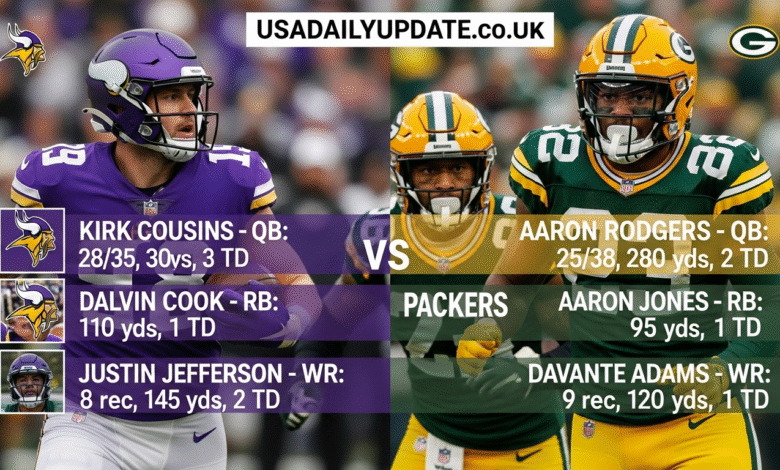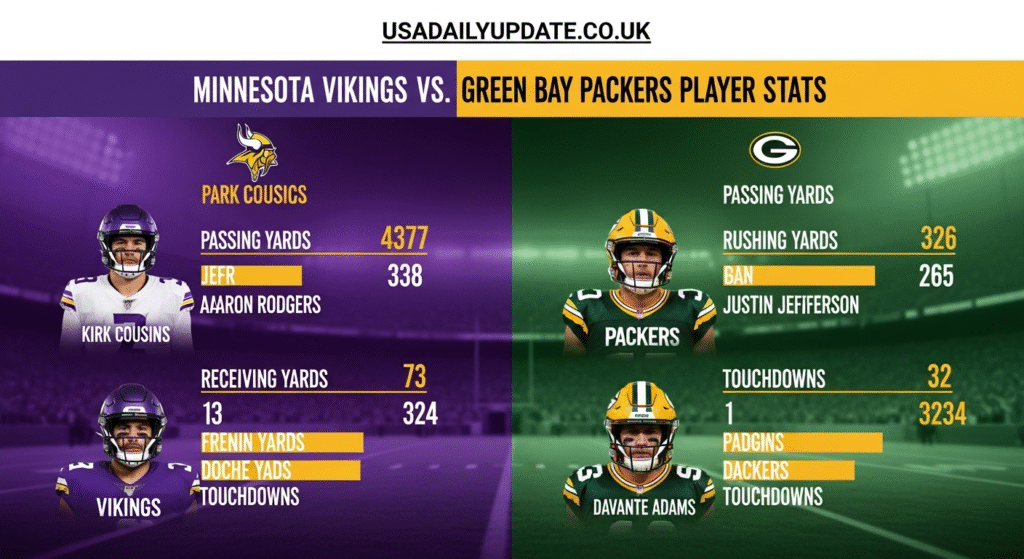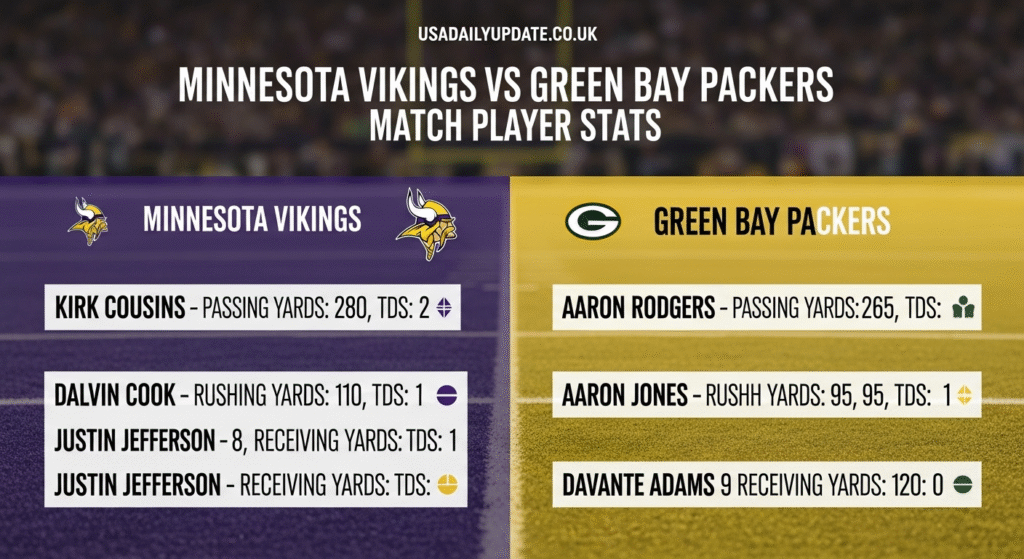Minnesota Vikings vs Green Bay Packers Match Player Stats: An In-Depth Analysis

Introduction to the Rivalry
The rivalry between the Minnesota Vikings and the Green Bay Packers is one of the most storied in the National Football League (NFL). Spanning several decades, this matchup is more than just a game; it embodies a fierce competition that has come to define both franchises. The history dates back to 1961 when the Vikings first entered the league, but the rivalry truly intensified in the 1970s as both teams began to vie for dominance in the NFC Central division.
Central to the significance of the Minnesota Vikings vs Green Bay Packers match player stats is the impact these games have had on the NFL landscape. The competition has produced numerous memorable moments, including thrilling comebacks, exceptional performances, and even controversial calls that have shaped the outcomes of games. For instance, the infamous “Hail Mary” game in 1975 and the epic clash in the 2010 NFC North division showdown illustrate the intense stakes involved.
Furthermore, this rivalry goes beyond the field; it has fostered a passionate fan base that eagerly anticipates each encounter. The tension between Vikings fans and Packers supporters adds a unique atmosphere to the matches, turning regular-season games into events that draw national attention. As these two teams clash, the performances of individual players often become critical factors in determining the outcome of the match, emphasizing the importance of analyzing key player stats. The Minnesota Vikings vs Green Bay Packers matches have consistently highlighted players who rise to the occasion, further igniting the rivalry as they strive for glory on the field.
Understanding the historical context of this rivalry is essential to appreciating the significance of each matchup, especially when examining the Minnesota Vikings vs Green Bay Packers match player stats. These encounters not only affect playoff positions but also contribute to the rich tapestry of NFL history, showcasing competition, sportsmanship, and the ever-evolving dynamics of the league.
Key Players to Watch
As anticipation builds for the Minnesota Vikings vs Green Bay Packers match, spotlighting key players becomes essential for understanding the potential dynamics of the game. Each team boasts significant talent capable of influencing the outcome based on current form, fitness levels, and historical performance in this intense rivalry.
For the Minnesota Vikings, quarterback Kirk Cousins stands out as a pivotal figure. His ability to read defenses and execute plays under pressure has been instrumental in their offensive strategies. In recent seasons, Cousins has maintained impressive statistics, often ranking among the top quarterbacks in the league. In the context of previous encounters against the Packers, his performances have varied, with some games showcasing his ability to excel against formidable defenses, while others reveal vulnerabilities that opponents might exploit.
On the other side, the Green Bay Packers proudly feature quarterback Aaron Rodgers, whose experience and playmaking skills are well-documented. Rodgers consistently ranks high in player statistics, particularly in touchdown-to-interception ratios. His leadership on the field has proven to be a decisive factor in past matchups against the Vikings, where his ability to perform in clutch situations often dictates the flow of the game. Furthermore, emerging star wide receiver Christian Watson has garnered attention due to his explosive speed and athleticism, making him a crucial target for Rodgers.
Health and fitness will undoubtedly play a role, as both teams are eager to see their key players compete at peak condition. Injuries, if any, can directly affect the execution of game plans and potentially sway the final score. Therefore, analyzing the Minnesota Vikings vs Green Bay Packers match player stats in conjunction with player conditions will be vital. Understanding these elements will provide insight into how the abilities of these key players could shape the outcome of this highly anticipated contest.
Quarterback Matchup Breakdown
In any professional football matchup, the performance of the quarterbacks often serves as a crucial determining factor. The upcoming Minnesota Vikings vs Green Bay Packers match presents an intriguing quarterback matchup, as both teams boast talented signal callers. For the Vikings, the focus lies on their dynamic quarterback, who has shown remarkable agility and decision-making skills in previous encounters. His experience in high-pressure situations positions him as a vital asset for the Vikings. Within the context of the Minnesota Vikings vs Green Bay Packers match player stats, his performance under pressure becomes particularly noteworthy, as he tends to maintain composure even when faced with formidable opposition.
On the other side, the Packers’ quarterback brings a wealth of experience and a unique skill set that has often confounded defenses. Known for an exceptional ability to read defenses and exploit mismatches, he excels in high-stakes games. Analyzing his head-to-head statistics against the Vikings reveals a consistent pattern of effective offensive execution, often leading to successful drives and scoring opportunities. His recent performances indicate a player in strong form, especially in critical moments of games where accuracy and quick decision-making are essential.
Both quarterbacks have showcased a mix of strengths and weaknesses throughout their careers. The Vikings’ quarterback may struggle against strong defensive fronts, which could be exacerbated in this matchup, while the Packers’ leader could benefit from the Vikings’ defensive inconsistencies. As both teams prepare for the Minnesota Vikings vs Green Bay Packers contest, the individual performances of these quarterbacks will certainly influence the overall outcomes. Their ability to adapt to pressure, manage the game clock, and deliver precise throws will be instrumental in securing a potential victory.

Wide Receivers and Targets
The wide receiver positions for both the Minnesota Vikings and Green Bay Packers play a crucial role in their respective offensive strategies. This analysis will focus on player statistics such as receptions, yardage, and touchdowns, as well as evaluate how these players are integrated into the teams’ schemes. Understanding their performance allows for a deeper insight into the resultant stats of the Minnesota Vikings vs Green Bay Packers match player stats.
For the Minnesota Vikings, standout wide receivers like Justin Jefferson have consistently proven to be game-changers. Jefferson’s ability to create separation and his excellent route-running skills have resulted in high reception totals and significant yardage gain. In recent seasons, he has repeatedly surpassed the 1,000-yard mark, indicating his pivotal role in the offensive unit. Alongside Jefferson, other receivers like Adam Thielen have also made impactful contributions, adding depth to the passing game. The Vikings often employ a pass-heavy strategy, leading to increased opportunities for their wide receivers to accumulate impressive stats.
On the other hand, the Green Bay Packers’ wide receiver corps, featuring players such as Davante Adams and recently drafted talent, tends to utilize precise passing and quick reads from their quarterback. Adams, known for his exceptional catching ability and deceptive speed, has recorded numerous touchdowns, frequently ranking among the league leaders in this category. The Packers’ offensive scheme integrates these talents effectively, often focusing on lateral routes that exploit the weaknesses in opposing defenses.
As these two teams prepare for their upcoming clash, potential matchups between the Vikings’ and Packers’ wide receivers will be critical. Analyzing their player stats will provide further insights into how each offense plans to leverage their strengths. This examination not only highlights individual prowess but also illustrates how these athletes could impact the overall narrative of the Minnesota Vikings vs Green Bay Packers match player stats.
Defensive Strengths and Weaknesses
The defensive units of the Minnesota Vikings and Green Bay Packers play a pivotal role in the outcome of any matchup, including their recent encounters. Evaluating the overall stats of both teams reveals distinct strengths and weaknesses that may influence the course of their upcoming game. The Vikings’ defense has consistently ranked among the upper echelon in the league, particularly in terms of sacks and interceptions. This season, they have recorded an impressive number of sacks, highlighting their ability to pressure opposing quarterbacks, disrupt plays, and capitalize on mistakes. Standout players such as their defensive linemen and linebackers have displayed extraordinary skills, transforming the defense into a formidable force.
Conversely, the Green Bay Packers have exhibited a strategically resilient defense that thrives on opportunism. They have demonstrated an ability to force turnovers, with a noteworthy tally of interceptions this season. The presence of star players in the secondary has proven to be crucial in this respect, showcasing their capacity to read the game and exploit offensive errors. However, their susceptibility to allowing points has emerged as a concern, often letting opponents score during critical moments. This inconsistency may hinder their potential, especially when facing an aggressive offensive lineup like that of the Vikings.
In analyzing the defensive metrics, points allowed becomes particularly significant. The Vikings have managed to keep their points allowed relatively low, underscoring their overall efficiency. In contrast, the Packers must address their vulnerabilities and fortify their defensive strategy to create a more balanced approach. As the Minnesota Vikings vs Green Bay Packers match approaches, the interplay of both defenses will undoubtedly shape the game’s dynamics, emphasizing the importance of these player stats in predicting the outcome.
Special Teams Impact
In the highly competitive landscape of the Minnesota Vikings vs Green Bay Packers rivalry, the significance of special teams often emerges as a critical factor that can swing the outcome of the match. Special teams encompass a variety of plays that don’t fall directly under offense or defense, yet their influence on the final score cannot be overstated. Kickers and return specialists, in particular, play pivotal roles in shaping the dynamics of these matchups.
For instance, the kicking game becomes crucial when the offense fails to score touchdowns. In the context of the Minnesota Vikings vs Green Bay Packers match, the performance of their kickers can dictate momentum. A reliable kicker may be the difference between a well-fought victory or a narrow defeat. During previous encounters, statistics have shown that successful field goals, particularly in tight games, can significantly enhance a team’s winning chances.
Return specialists also hold particular importance. They are tasked not only with fielding kicks and punts but also with providing favorable field position for their teams. The ability to break off substantial returns can set the stage for subsequent offensive plays. For the Minnesota Vikings and Green Bay Packers, maintaining strong special teams through effective returns has been critical. Analysis of past match player stats reveals instances where impactful returns have directly led to scoring opportunities, proving that these plays are far from inconsequential.
Ultimately, the outcome of the Minnesota Vikings vs Green Bay Packers match often hinges on special teams performance. As both teams gear up for their next rivalry encounter, the impact of kickers and return specialists will likely be scrutinized closely, as their contributions could very well tip the scales in this contest. Such analysis provides deeper insights into the state of each team’s strategic planning and readiness heading into their face-off.
Game Day Conditions and Atmosphere
The game day atmosphere for the much-anticipated Minnesota Vikings vs Green Bay Packers match plays a pivotal role in shaping the performance of the players. A myriad of factors, including weather conditions, crowd support, and field quality, can have profound effects on the strategies employed by both teams.
Weather conditions are crucial in determining how the game unfolds. Typically, if the match is held in early autumn, teams may expect mild temperatures, but they should also be prepared for unexpected changes, such as rain or wind. Rain, for instance, can lead to slippery field conditions and affect players’ traction, consequently altering the dynamics of the game. The Minnesota Vikings, known for their strong running game, may find it challenging to execute their offensive plays effectively if the ground is wet and muddy. Conversely, the Green Bay Packers, with their versatile offensive strategies, could exploit a more open field, leveraging their passing game.
Crowd support is another pivotal element that cannot be underestimated. The energy generated from enthusiastic fans can significantly boost a team’s morale and serve as an influential factor during critical game moments. In this highly competitive rivalry, Packers fans often create an electrifying atmosphere at Lambeau Field, leading to heightened pressure on the visiting Vikings. A loud crowd can disrupt the calling of plays, impacting communications among players, which may result in errors or delays. Additionally, familiarity with home turf provides the Packers with an advantage; knowing the field conditions and nuances can enhance player performance.
In evaluating the Minnesota Vikings vs Green Bay Packers match player stats, it is essential to consider how these elements contribute to the overall environment of the game. The outcomes may be influenced by not only the athletes’ skills and tactics but also the ambient conditions that frame their performance on game day.

Statistics Comparison: Past vs. Present
When analyzing the Minnesota Vikings vs Green Bay Packers match player stats, it is crucial to examine the historical performance of various players over the years in comparison to their current statistics. This comparison reveals significant trends that can inform predictions for upcoming games between these two teams. Historically, the rivalry has showcased standout performances from iconic players. For instance, legendary quarterback Brett Favre not only amassed impressive passing yards but also displayed remarkable consistency that set high expectations for future players. On the other hand, contemporary quarterbacks such as Kirk Cousins and Aaron Rodgers offer a different style of play, reflected in their current stats that emphasize accuracy and efficiency.
In terms of running backs, both teams have produced elite players whose performances impact the outcomes of their respective matches. The Vikings’ all-time standout, Adrian Peterson, recorded astonishing rushing yards and touchdowns during his tenure. In contrast, current players such as Dalvin Cook continue to build upon these legacies with their ability to break tackles and gain significant yardage. These evolving statistics illustrate how styles of gameplay have transitioned while still maintaining the essence of the rivalry.
Furthermore, wide receivers from both teams have also exhibited shifts in performance metrics. Historical figures like Randy Moss and Sterling Sharpe set benchmarks by regularly surpassing receiving yards and touchdowns. Today’s receivers, including Justin Jefferson and Davante Adams, demonstrate the importance of yardage after the catch and separation from defenders, thus bringing a modern flair to the rivalry. This evolution of player statistics, when viewed in the context of previous matches, not only highlights individual excellence but also underscores the competitive nature of the Minnesota Vikings vs Green Bay Packers match, offering insights that can guide future predictions regarding player performances and overall game outcomes.
Match Predictions and Expected Outcomes
As the Minnesota Vikings prepare to face the Green Bay Packers, fan anticipation grows regarding the potential outcomes of this storied rivalry. Analyzing the Minnesota Vikings vs Green Bay Packers match player stats reveals critical insights that contribute to predictions about the game’s result. Player performance, as reflected in previous encounters and this season’s statistics, plays a significant role in shaping expectations.
Recent performance metrics highlight key players from both teams. For the Vikings, quarterback Kirk Cousins has consistently posted impressive statistics, showcasing his capacity to lead the offense effectively. Meanwhile, running back Dalvin Cook remains a crucial asset, displaying an ability to exploit defensive weaknesses. On the other hand, the Packers will rely on the prowess of Aaron Rodgers, whose experience and playmaking skills are pivotal. The duo of Davante Adams and Aaron Jones provide a formidable combination, often proving to be game-changers. By assessing these player stats, one can better gauge how each team might perform under pressure.
Experts often utilize statistical models to project match outcomes, incorporating factors such as player injuries, recent form, and historical performance against similar opponents. Predictions for this contest suggest a competitive atmosphere, with both teams having their strengths. The combination of the Vikings’ robust defense against the Packers’ dynamic offense adds layers of complexity to forecasting the outcome. With the stakes high, it remains to be seen whether past statistical trends hold true or if a new narrative will unfold.
In conclusion, the Minnesota Vikings vs Green Bay Packers match will undoubtedly captivate fans, as understanding player stats and overall team dynamics provides a clearer picture of what to expect. With both teams possessing star players capable of altering the game’s trajectory, anticipation builds around the potential for an unforgettable showdown. The integration of predictive analytics emphasizes the importance of these metrics in developing informed expectations for the match outcome.
Also read usadailyupdate.co.uk



